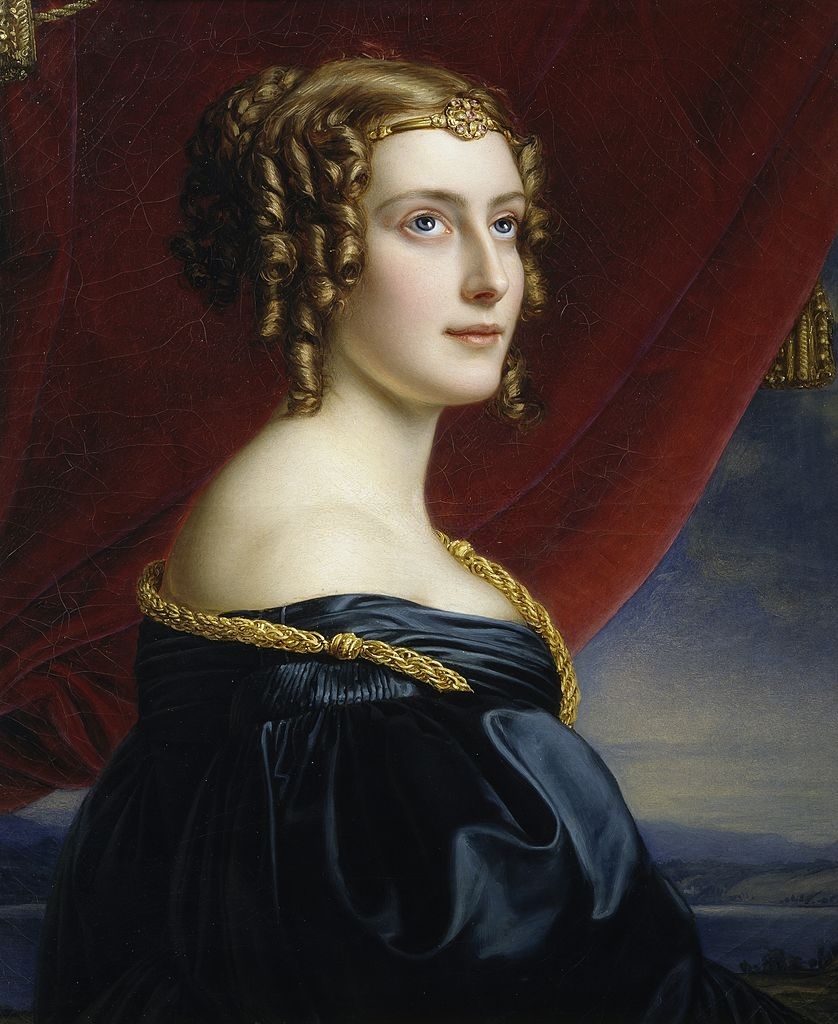 |
| Our regular guest blogger, Lady Jane Digby's Ghost |
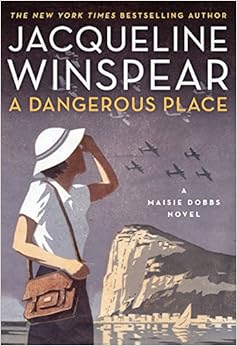 Jacqueline Winspear is back with another book in the Maisie Dobbs series. The new book, A Dangerous Place (Harper, March 17), is set in the mid-1930s, in the British Crown Colony of Gibraltar. Maisie is returning to England after a long stay in India. She had gone to India to recover from the pain of her short marriage to James Compton, whose death in an airplane accident in Canada also caused Maisie to miscarry their child.
Jacqueline Winspear is back with another book in the Maisie Dobbs series. The new book, A Dangerous Place (Harper, March 17), is set in the mid-1930s, in the British Crown Colony of Gibraltar. Maisie is returning to England after a long stay in India. She had gone to India to recover from the pain of her short marriage to James Compton, whose death in an airplane accident in Canada also caused Maisie to miscarry their child.In a brief stop on the journey from India to England, Maisie impulsively disembarks in Gibraltar and lets the boat sail on without her. She's not ready to face the ghosts of her past in London. While in Gibraltar, she gets involved in a murder investigation and begins to regain her crime-solving mojo.
Jacqueline Winspear began writing her Maisie Dobbs books in the early 2000s; this is the 12th in the series. The first few novels in the series were extremely well written, with Winspear carefully detailing the back story of Maisie's life, her studies at Cambridge and her nursing work in France in the Great War. She created the character of Dr. Maurice Blanche, who was Maisie's mentor and teacher as Maisie opened up her detective agency in London after the war. We read the cases that Maisie took on in those first few books, and we see her private life, as the doctor she had loved during the war is taken from her by a lingering death. Maisie and the secondary characters were brilliant creations in Jacqueline Winspear's talented hands.
 |
| Gibraltar |
I had the opportunity to read an advance review copy of A Dangerous Place, and I liked it a lot. Winspear writes Maisie with a seemingly renewed interest in the wider world around her––a visit to Spain and involvement in the Spanish Civil War––as well as a return to her use of psychology in crime solving. While I don't think this new book is quite as good as her first few books, I can see a return to the style and to the character Maisie Dobbs should be.
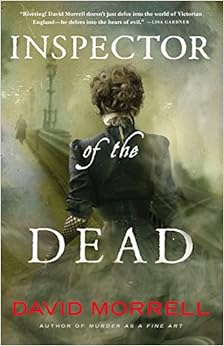 Another established author with a new series book is David Morrell, who lives out here where I am, in Santa Fe, and who has spoken several times at my adult learning program. He's a professor of American Literature and is very mild-mannered in person. You'd scarcely picture him as the author of the Rambo series and other killer-thrillers. But he's also written quieter, more historical fiction.
Another established author with a new series book is David Morrell, who lives out here where I am, in Santa Fe, and who has spoken several times at my adult learning program. He's a professor of American Literature and is very mild-mannered in person. You'd scarcely picture him as the author of the Rambo series and other killer-thrillers. But he's also written quieter, more historical fiction.Morrell is the author of Murder as a Fine Art (Mulholland Books, 2013), a study of the lurid murders in Victorian London and the involvement of writer and opium addict, Thomas De Quincey. It is an excellent historical novel, and Morrell has returned with a sequel, Inspector of the Dead (Mulholland Books, March 24). De Quincey and his daughter, as the main characters, look at London murders during the Crimean War. They are aided by two Scotland Yard detectives who were introduced in Murder as a Fine Art. I am looking forward to devouring this book in the coming week!
Okay, you should know that I adore family sagas. I am never so happy as when I'm deeply involved in the fortunes and woes of a large family. (I wish that Taylor Caldwell's publishers would bring back her Dynasty of Death series, that special three-book examination of the sins of the arms-manufacturing Bouchard family, which extended down through many generations.)
One of the best new family sagas I can recommend is The Rocheforts, by French author Christian Laborie (Publishers Square, May 5). The book, a longish saga of the Rochefort family of the Languedoc-Roussillon region in southern France, begins with an 1898 mystery. A man is spotted entering a darkened house and seen leaving with . . . something. The reader doesn't know what the bundle is, but the author gives clues. And we do find out, later on.
The story moves in time to the merging of two family fortunes––fortunes of unequal size, however––with the marriage of Louise Rouviere and Jean-Christophe Rochefort. Louise is from a prosperous farm family which, unfortunately for the father, Donatien, consists of only daughters. He and his wife decide to adopt a child from an orphanage in Nimes and groom him to take over the family farm. The rest of the book is the story of the Rochefort and Rouviere families and how the two interact, interlove and intermarry. The villain of the book––and there really is only one––is the patriarch of the Rocheforts, Anselme, who, time and time again, manages to alienate everyone around him. (I say there is just one villain, but there is another bad guy, a sort of Anselme Mini Me.) From Anselme, the lies and coverups do go from generation to generation.
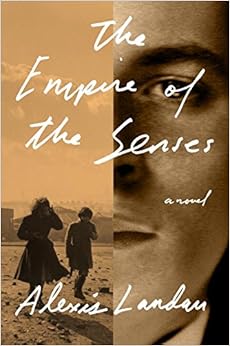 Another excellent family book set around the same time is first-time novelist Alexis Landau's The Empire of the Senses (Pantheon, March 17). The book is set mostly in Berlin and begins with the mixed marriage of Lev Pearlmutter and his Christian wife, Josephine, in the early 1900s, extending through World War I and into World War II. Landau does a superb job of looking at how the religious and societal differences of Lev and Josephine and their two children are reflected in the German society of the time. The Empire of the Senses is not a mystery in the accepted sense of crime fiction, but it is rather a mystery of the personality.
Another excellent family book set around the same time is first-time novelist Alexis Landau's The Empire of the Senses (Pantheon, March 17). The book is set mostly in Berlin and begins with the mixed marriage of Lev Pearlmutter and his Christian wife, Josephine, in the early 1900s, extending through World War I and into World War II. Landau does a superb job of looking at how the religious and societal differences of Lev and Josephine and their two children are reflected in the German society of the time. The Empire of the Senses is not a mystery in the accepted sense of crime fiction, but it is rather a mystery of the personality.The book's action begins in 1914, as Lev Pearlmutter leaves his family to go off to war, joining millions of other men from France, Britain, Russia and Austria-Hungary, as they prepared for the war they thought would be over by Christmas. Of all the reasons soldiers enlisted, probably few did it for the same reason as Lev Pearlmutter did; he wanted to prove to the Christian family he married into that he was just as good a German as they were, despite his Jewish background.
Lev is sent to the Russian front and spends four years as a medic. While there, he falls in love with Leah, a young Jewish woman, whom he is loathe to leave at the war's end. But he returns to his wife and family and his assimilated place in Berlin society. As the 1920s proceed, the Pearlmutter family falls apart. Tolstoy was right about unhappy families, and the Pearlmutters are a classic example of his dictum.
I read The Rocheforts and The Empire of the Senses in prepublication and can heartily recommend them both.
I have placed my preorder for Anne Enright's The Green Road (W. W. Norton & Company, May 11). Enright is an Irish author who has had several other books published here in the US. I haven't read any of her previous novels, but The Green Road looks very interesting. It's the story of a family of Rosaleen Madigan and her four grown children, who return to their childhood home to divvy up both the possessions and the memories. We've all seem this story line before––with some families more dysfunctional than others––but Rosaleen Madigan and her children look like a family I'd like to meet.
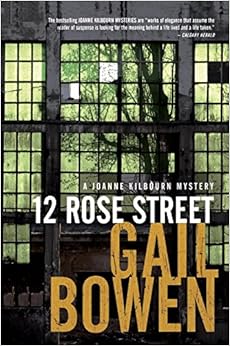 The only Canadian mystery writer I've read is Louise Penny, the author of the Three Pines/Armand Gamache novels. But now I've found Gail Bowen, who is publishing 12 Rose Street (McClelland & Stewart, March 3), the 13th in her Joanne Kilbourn series. Joanne, a resident of Regina, Saskatchewan, is described as an amateur sleuth, which seems to imply a lack of official detecting by the police. This book is about the mayoral campaign of Kilbourn's husband, Zack, and the murders that seem to crop up in its wake. The murders have a personal connection to Joanne and Zack and she's pressed to work to solve them. I'm intrigued.
The only Canadian mystery writer I've read is Louise Penny, the author of the Three Pines/Armand Gamache novels. But now I've found Gail Bowen, who is publishing 12 Rose Street (McClelland & Stewart, March 3), the 13th in her Joanne Kilbourn series. Joanne, a resident of Regina, Saskatchewan, is described as an amateur sleuth, which seems to imply a lack of official detecting by the police. This book is about the mayoral campaign of Kilbourn's husband, Zack, and the murders that seem to crop up in its wake. The murders have a personal connection to Joanne and Zack and she's pressed to work to solve them. I'm intrigued.Can a mystery be something other than that of crime? Can it be about human survival in a hostile environment? If that interests you as a reader, I'd advise reading a memoir newly published in English by Marie Jalowicz Simon. It was just published in England by the Clerkenwell Press under the title Gone to Ground (translated from the German by Anthea Bell), and can be ordered in the US from third-party sellers or direct from the UK. Alternatively, you can wait a few months until it is published in the US under the title Underground in Berlin: A Young Woman's Extraordinary Tale of Survival in the Heart of Nazi Germany (Little, Brown and Company, September 8).
Marie was a young Jewish woman in World War II Berlin who became a "U-Boat," that is, a Jew who attempts to live a life in hiding. The were given that name because they attempt to move under the Nazi radar. They moved from one hiding place to another, trying to evade German officials who wanted to send every Jew off "to the East." I'm still reading the book, but what strikes me is the fact that as Marie Jalowicz Simon moved around Germany, from 1941 to 1945, she had no idea how long she was going to have to keep living on the edge. Although the news of the German defeat at Stalingrad in 1943 portended the end of the war and the Nazi regime, no one knew the fighting––and persecution––would end. I'm not sure I could survive that wartime mystery of not knowing.
 Another Holocaust-themed book is getting a lot of buzz––not all of it positive. Williams College professor Jim Shepard's seventh novel, The Book of Aron (Knopf, May 5), is a novel set in the Warsaw Ghetto in World War II. It's the story of Aron, a young boy separated from his family in the ghetto, who lives at Janusz Korczak's orphanage. Shepard seems to be unsparing in his description of the brutalities and horrors of the ghetto and how the children live (exist?) through it. A friend of mine read the book and reviewed it by asking: "why was this book written?" By that, he meant, why had Shepard chosen yet again another Holocaust story, when there are so many out there? I don't know, and maybe every book should be read––by someone––if only to keep the subject alive and in people's minds and hearts.
Another Holocaust-themed book is getting a lot of buzz––not all of it positive. Williams College professor Jim Shepard's seventh novel, The Book of Aron (Knopf, May 5), is a novel set in the Warsaw Ghetto in World War II. It's the story of Aron, a young boy separated from his family in the ghetto, who lives at Janusz Korczak's orphanage. Shepard seems to be unsparing in his description of the brutalities and horrors of the ghetto and how the children live (exist?) through it. A friend of mine read the book and reviewed it by asking: "why was this book written?" By that, he meant, why had Shepard chosen yet again another Holocaust story, when there are so many out there? I don't know, and maybe every book should be read––by someone––if only to keep the subject alive and in people's minds and hearts.Some quick thoughts. Nelson DeMille has a new book out this spring called Radiant Angel (Grand Central Publishing, May 26). This is a new entry in his John Corey/Kate Mayfield series, and it's a big boy, with over 600 pages. I hope it's far better written than the most recent book in the series, the execrable The Panther (Grand Central Publishing, 2012). Look for the new one if you're a DeMille fan (as I used to be).
If you're looking for a fairly good double biography, take a look at Hissing Cousins: The Untold Story of Eleanor Roosevelt and Alice Roosevelt Longworth, by Marc Peyser and Timothy Dwyer (Nan A. Talese, March 31). Those cousins––the title is a play on the "kissing cousins" term––are Eleanor Roosevelt and Alice Roosevelt Longworth. The authors play up the "competition" between the Democratic and Republican side of the Roosevelt family. It's pretty well written, but a bit heavy-handed in its treatment of this war of the cousins.
Note: Thanks to the publishers (and Amazon's Vine program) for providing advance review copies of A Dangerous Place, The Rocheforts, The Empire of the Senses and Hissing Cousins.

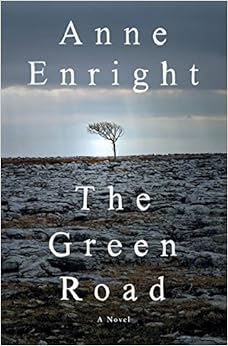


No comments:
Post a Comment